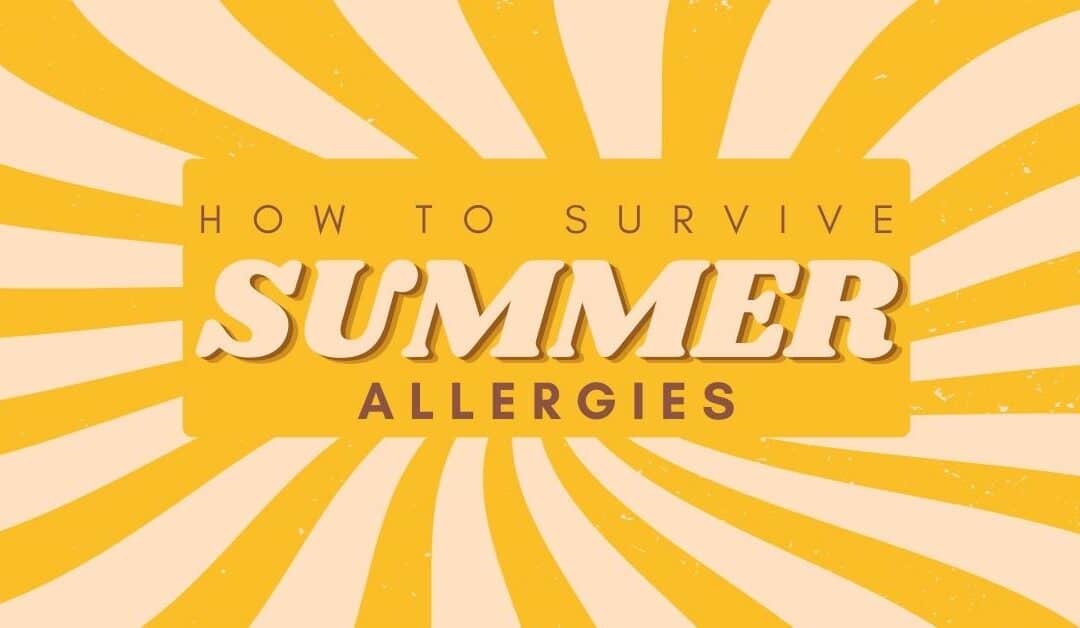Summertime is finally here, with all the joys of being outdoors – warm weather, colorful flowers, leafy trees, and green grass. Unfortunately for those of us who suffer from allergies, it also brings an itchy throat and ears, sneezing fits, and a general feeling of misery. If you’re wondering what to do about your summer allergies, don’t worry! Let’s look at some tips on how to survive the allergy season well.
Why is Summer Bad for Summer Allergies?
Summer is a time for fun in the sun, but it can also be a time for misery if you suffer from summer allergies. Trees and flowers release pollen into the air, triggering an immune response in people suffering from allergic rhinitis. This immune response can lead to an itchy throat and ears, congestion, and other symptoms.
Summer is a significant allergy season due to the high pollen count.
The trees and flowers that release pollen in the summer vary depending on where you live. Some of the most common culprits include ragweed, oak, sumac, and birch. Weeds such as sagebrush and tumbleweed can also trigger allergies. Allergic rhinitis is also called hay fever. If you’re unsure what’s causing your spring allergies, it’s a good idea to see your ENT doctor for testing. Dust mites are another common indoor trigger for summer allergies.
You can also check out websites that let you know what is releasing pollen in your area daily. The National Allergy Bureau releases a daily pollen report that is available online.
How to Survive Seasonal Allergies
There are different allergy seasons, and summer is one of the most challenging due to high pollen levels. Fortunately, there are some things you can do to ease your summer allergy symptoms, and make it through the summer. Here are a few tips:
- Stay indoors as much as possible, especially when the pollen count is high.
- Wear a mask or scarf over your nose and mouth if you have to go outside.
- Avoid areas where there are lots of flowers or trees.
- Take an antihistamine before you go outside.
- Rinse your nose and eyes with saline water when you come inside.
- Vacuum regularly and dust with a damp cloth to remove pollen from your home.
Allergy Medications For Itchy Throat and Ears
Many over-the-counter medications can help with spring allergy, summer allergies, and hay fever symptoms. Antihistamine medications such as cetirizine (Zyrtec) and loratadine (Claritin) can relieve itchy throat, itchy eyes, and congestion.
An OTC nasal spray such as fluticasone (Flonase) can help reduce congestion and inflammation. Fluticasone is a corticosteroid that reduces the signs and symptoms of inflammatory illnesses and allergic responses like inflammation, redness, and itching. This type of nose spray takes a little longer to work than antihistamine nasal sprays, but the effects are more long-lasting.
Another nasal spray to try is Nasacort Allergy 24HR, available over-the-counter. This medication is another corticosteroid that works by reducing inflammation in the nose.
Astepro nasal spray works against seasonal allergy by combating histamine, a chemical produced by the body. Histamine causes the itching, sneezing, runny nose, and watery eyes of summer allergies. Nasal sprays like these work by blocking the release of histamine in the nose.
Decongestants such as pseudoephedrine (Sudafed) can help to reduce nasal congestion. Decongestants constrict blood vessels in the nose and sinuses, reducing swelling and inflammation.
If you have itchy eyes, try using allergy-reducing eye drops. Ketotifen (Zaditor) works by preventing histamine release in the eyes. These drops can help to reduce itchy, watery eyes. Lodoxamide (Alomide) eye drops are another mast cell stabilizer that can prevent histamine release.
If you find that your allergy symptoms are not relieved by over-the-counter allergy medications alone, it’s a good idea to see an ENT doctor. They can help identify the triggers of your allergies and provide you with more targeted treatment options and may recommend allergy shots to reduce your symptoms in the long run.
Long-Lasting Solutions for Summer Allergy Symptoms
Whether your allergies are terrible or mild, an ENT doctor can determine your allergy triggers by doing a physical examination and reviewing your medical history. They may also recommend allergy testing to pinpoint the specific allergens causing your symptoms. Mold spores are a common trigger for spring and summer allergies.
Allergy shots are a form of immunotherapy that can help reduce the severity of your allergies. They work by exposing you to small amounts of the specific allergens you struggle with. Over time, the amount of allergen in each shot gradually increases. Exposure to these allergens in increasingly larger amounts helps your body build immunity to the allergen, eventually reducing or eliminating your symptoms. Tree pollens are another common allergen that can be addressed through immunotherapy.
Sublinguals are another form of immunotherapy that works to decrease your allergic reactions over time. This therapy uses drops or tablets that you place under your tongue. The drops or tablets contain a small amount of the specific allergens your body reacts to. Like allergy shots, sublingual immunotherapy helps your body build up immunity to the allergen over time, eventually reducing or no allergic reaction and eliminating your symptoms.
Talk to your ENT doctor about allergy shots or sublingual immunotherapy if you’re struggling with summer allergies. These long-lasting solutions can help you enjoy the summer without the misery of seasonal allergies.
We Can Help with Allergic Reactions
At Enticare, our board-certified ENT doctors focus on diagnosing and treating conditions related pollen allergies to the ear, nose, throat, and sinuses. Contact us today to schedule an appointment if you’re struggling with summer allergies. We can help you get your allergies under control so you can enjoy the warmer months!

